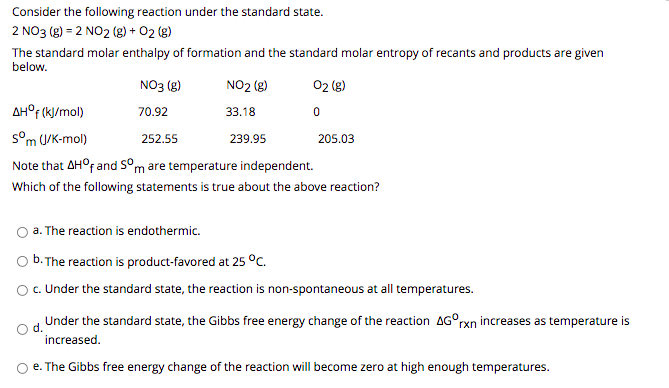Consider the following reaction under the standard state. 2 NO3 (g) = 2 NO2 (g) + 02 (g) The standard molar enthalpy of formation and the standard molar entropy of recants and products are given below. NO3 (g) NO2 (g) 02 (g) AH°F (k//mol) 70.92 33.18 s°m U/K-mol) 252.55 239.95 205.03 Note that AHOf and S°m are temperature independent. Which of the following statements is true about the above reaction?
Consider the following reaction under the standard state. 2 NO3 (g) = 2 NO2 (g) + 02 (g) The standard molar enthalpy of formation and the standard molar entropy of recants and products are given below. NO3 (g) NO2 (g) 02 (g) AH°F (k//mol) 70.92 33.18 s°m U/K-mol) 252.55 239.95 205.03 Note that AHOf and S°m are temperature independent. Which of the following statements is true about the above reaction?
Chemistry: The Molecular Science
5th Edition
ISBN:9781285199047
Author:John W. Moore, Conrad L. Stanitski
Publisher:John W. Moore, Conrad L. Stanitski
Chapter16: Thermodynamics: Directionality Of Chemical Reactions
Section: Chapter Questions
Problem 93QRT: The standard molar entropy of iodine vapor, I2(g), is 260.7 J Kl mol-1 and the standard molar...
Related questions
Question
100%
Thank you.

Transcribed Image Text:Consider the following reaction under the standard state.
2 NO3 (g) = 2 NO2 (g) + 02 (g)
The standard molar enthalpy of formation and the standard molar entropy of recants and products are given
below.
NO3 (g)
NO2 (g)
02 (g)
AH°F (k/mol)
70.92
33.18
s°m U/K-mol)
252.55
239.95
205.03
Note that AHOf and S°m are temperature independent.
Which of the following statements is true about the above reaction?
a. The reaction is endothermic.
b.The reaction is product-favored at 25 °C.
c. Under the standard state, the reaction is non-spontaneous at all temperatures.
Under the standard state, the Gibbs free energy change of the reaction AG°rxn increases as temperature is
d.
increased.
O e. The Gibbs free energy change of the reaction will become zero at high enough temperatures.
Expert Solution
This question has been solved!
Explore an expertly crafted, step-by-step solution for a thorough understanding of key concepts.
This is a popular solution!
Trending now
This is a popular solution!
Step by step
Solved in 4 steps with 4 images

Knowledge Booster
Learn more about
Need a deep-dive on the concept behind this application? Look no further. Learn more about this topic, chemistry and related others by exploring similar questions and additional content below.Recommended textbooks for you

Chemistry: The Molecular Science
Chemistry
ISBN:
9781285199047
Author:
John W. Moore, Conrad L. Stanitski
Publisher:
Cengage Learning

Principles of Modern Chemistry
Chemistry
ISBN:
9781305079113
Author:
David W. Oxtoby, H. Pat Gillis, Laurie J. Butler
Publisher:
Cengage Learning

Chemistry & Chemical Reactivity
Chemistry
ISBN:
9781337399074
Author:
John C. Kotz, Paul M. Treichel, John Townsend, David Treichel
Publisher:
Cengage Learning

Chemistry: The Molecular Science
Chemistry
ISBN:
9781285199047
Author:
John W. Moore, Conrad L. Stanitski
Publisher:
Cengage Learning

Principles of Modern Chemistry
Chemistry
ISBN:
9781305079113
Author:
David W. Oxtoby, H. Pat Gillis, Laurie J. Butler
Publisher:
Cengage Learning

Chemistry & Chemical Reactivity
Chemistry
ISBN:
9781337399074
Author:
John C. Kotz, Paul M. Treichel, John Townsend, David Treichel
Publisher:
Cengage Learning

Chemistry for Engineering Students
Chemistry
ISBN:
9781337398909
Author:
Lawrence S. Brown, Tom Holme
Publisher:
Cengage Learning

Chemistry: An Atoms First Approach
Chemistry
ISBN:
9781305079243
Author:
Steven S. Zumdahl, Susan A. Zumdahl
Publisher:
Cengage Learning

Chemistry
Chemistry
ISBN:
9781305957404
Author:
Steven S. Zumdahl, Susan A. Zumdahl, Donald J. DeCoste
Publisher:
Cengage Learning